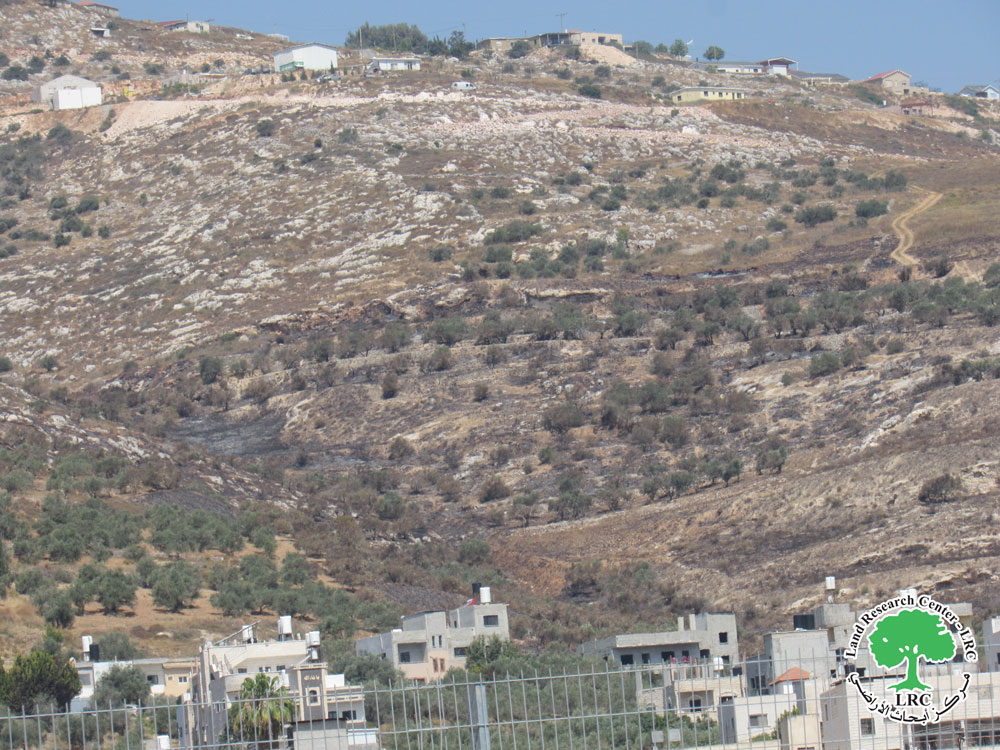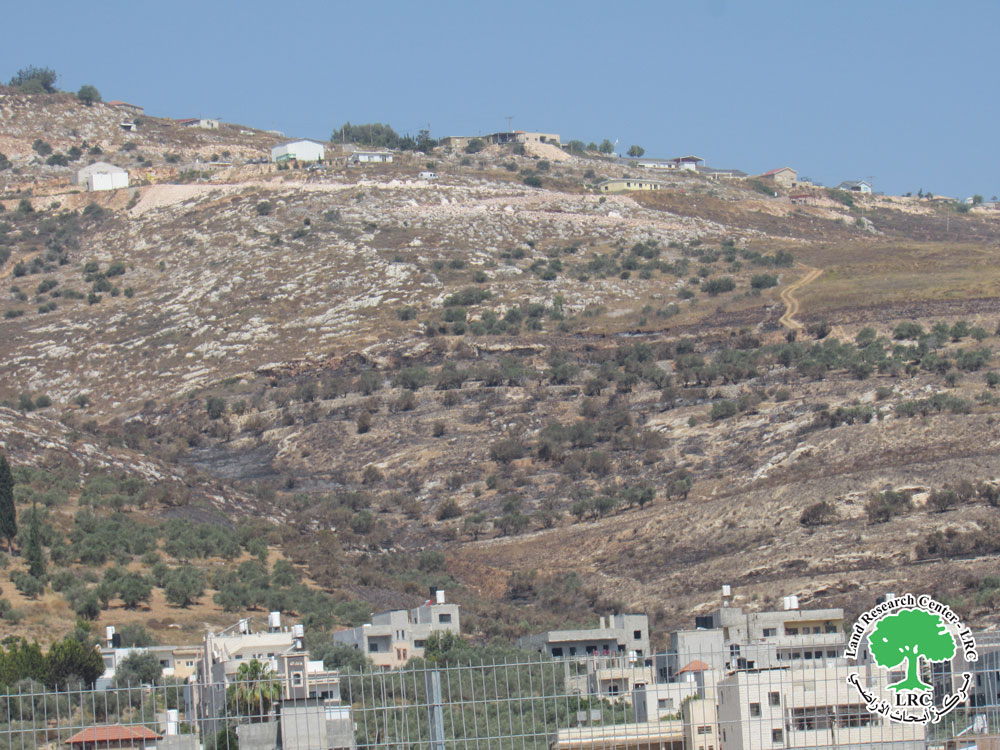Burning 466 Olive Trees and Partially Damaged in Huwwara Town/ South Nablus
Violation: Burning 466 olive trees.
Location: Huwwara town, south Nablus.
Date: June,12th 2025.
Perpetrators: Settlers.
Affected party: Several agricultural farmers from the town.
Details:
Thursday morning, June, 12th 2025, a group of settlers set fire in olive groves in Al Wajeh Al Gharbe area located west Huwwara town, south Nablus.
It’s worth mentioning that settlers believed came from Yitzahr settlement located on parts of Huwwara town, west part, as they deliberate to set fire in several locations,
It’s worth mentioning that the existing of settlers’ obstacle civil defense from approaching, causing to spread the fire towards citizens homes in the town. As the abundance of wild grass and the fact that the land has not been plowed for the third consecutive year significantly contributed to the rapid spread of the fire, which extended over 43 dunams. as a result, no fewer than 466 olive trees damaged, having been partially burned- with their branches and parts of their trunks.
According to field monitoring, the affected trees belong to several farmers as follows:
The affected farmer | Family member | Female number | Children number | The number of affected trees |
Kefah Majeed As’ad Odeh | 4 | 2 | 1 | 98 |
Moy’ed Nayef Mahmoud Odeh | 3 | 1 | 0 | 46 |
Myasara Faleh Saleh Odeh | 1 | 1 | 0 | 45 |
Yahyia Mohammad Mahmoud Qados | 5 | 2 | 3 | 40 |
Morad Ma’rouf Kamel Najar | 5 | 2 | 1 | 70 |
Mansour Qasem Mohammad Zein | 2 | 1 | 0 | 32 |
Zahyia Ibrahim Mohammad Shhadeh | 4 | 2 | 0 | 30 |
Sab’a Saleem Ahmad Odeh | 7 | 4 | 4 | 90 |
Arafat Ghaleb Ahmad Deik | 4 | 2 | 0 | 15 |
Total | 35 | 17 | 9 | 466 |
The affected farmer Moa’yed Odeh to the LRC told as follows:
‘’ I own a piece of land with total area of 4 dunams planted with olive trees, since the war on Gaza 2023, we have been facing a major problem, we can’t reach to our lands and checking up, although its near our home, noted that Yiztahr settlement located on 500 meters away from the affected land. As the abundance of weeds has facilitated the settlers’ ability to set fire to the land and damage the olive trees. The settlers deliberate ignited fires at six different locations on the land, aiming to expend the scope of the blaze.’’
He added:
‘’ We tried to reach the land with a large group of farmers at the time of the fire, we contacted with civil liaison office in Nablus and the civil defense in the nearby town of Burin, the occupation forces allowed to civil defense crews to enter an hour after the fire broke out, which the fire extended to vast areas from lands and burned the citizens’ homes in the same area – a total of 11 homes.’’
What happened has become repeat every year, settlers set fire in different locations with aim to destroy the agriculture in the town, when I see what has happened to my trees, I feel a deep sense of shock and sorrow, especially, since I have been caring for these trees for many years and have lived with them for a long time. Today they are being destroyed by a group of settlers, even though these trees used to provide me with no less than 120 kilograms of olive oil annually.
Overview of Huwwara Town:
Hawara town is located 8 kilometers south of Nablus city, on bypass road number 60, which connects the northern and southern West Bank. This road has come to be known as the "Street of Death" due to the frequent daily accidents involving vehicles, including hit-and-runs and collisions. The Hawara municipality has repeatedly attempted to maintain the road and put up warning signs, but the Israeli occupation impedes the maintenance process and refuses to allow even basic traffic signs.
The population of Hawara town is 6,659 as of 2017, divided into three main families: Awda, Dumeidi, and Khamos. Additionally, 3% of the town’s population are refugees.
The total area of Hawara town is 8,520 dunams, of which 1,116 dunams are designated for building purposes. On the village's land, the Israeli settlement "Yitzhar" has confiscated 331 dunams, while bypass road number 60 has seized 430 dunams of its land.
Huwwara town:
Hawara town is located 8 kilometers south of Nablus city, on bypass road number 60, which connects the northern and southern West Bank. This road has come to be known as the "Street of Death" due to the frequent daily accidents involving vehicles, including hit-and-runs and collisions. The Hawara municipality has repeatedly attempted to maintain the road and put up warning signs, but the Israeli occupation impedes the maintenance process and refuses to allow even basic traffic signs.
The population of Hawara town is 6,659 as of 2017, divided into three main families: Awda, Dumeidi, and Khamos. Additionally, 3% of the town’s population are refugees.
The total area of Hawara town is 8,520 dunams, of which 1,116 dunams are designated for building purposes. On the village's land, the Israeli settlement "Yitzhar" has confiscated 331 dunams, while bypass road number 60 has seized 430 dunams of its land.
Burning Agricultural Lands …… A Form of Israeli Violations of Palestinian Environment:
Agriculture is considered a fundamental pillar for Palestinian family, as it provides food security and meets their essential needs. Palestinian farmers also rely on it as a primary source of income. However, in recent times, agriculture has become a difficult and risky endeavor, with those due to the escalating acts of violence and vandalism by settlers—often under the protection and even participation of Israeli occupation forces. Their primary goal is to seize the land and all that is on it, wreaking havoc through bulldozing, destruction, poisoning and flooding fields with wastewater, all the way to burning trees and crops- polluting the air and soil with no deterrent whatsoever.
In addition to the ongoing land confiscations, denial of farmers’ access to their lands, and the closure of many agricultural roads, settlers and the Israeli forces have recently intensified their acts of burning crops and trees. As a result, settlers are causing severe environmental damage to the Palestinian landscape and its surrounding, leaving behind plastic waste and chemical pesticides that release various pollutants into the air. These pollutants disturb the environment and inflict harm on humans, animals and agricultural produce alike. Moreover, during fires, ash practical become airborne and contributed to further pollution.
Despite the fact that the Israeli Ministry of Environmental Protection is the responsible authority for environmental protection and pollution control, as stated on its official website—where it mentions that "air pollution does not stay in one place, nor does it know borders; it spreads according to climate conditions, winds, temperature, and humidity"—the primary contributors to air pollution are the settlers in the settlements and outposts across the West Bank. The burning of agricultural structures, trees, crops, other buildings, and even Palestinian homes and vehicles is a widespread practice among settlers.
According to the Israeli Criminal Procedures Order of 2022, "burning waste in an illegal location is subject to a fine of 2,000 shekels for an individual and 12,000 shekels for a company." The order further acknowledges that such practices can lead to chronic illnesses and an increased risk of cancer due to the inhalation of toxic substances.
The burning of such agricultural rooms is no less harmful than burning waste; in fact, it is even more detrimental because it occurs on agricultural land that is privately owned by Palestinians. Therefore, the violation should be considered more severe due to the illegal entry onto someone else's property and the environmental harm caused.
Undoubtedly, the actions of the Israeli side violate not only international laws but also Israeli laws themselves. Referring to the details of this case, the Israeli Penal Code of 1977 and its amendments stipulate that trespassing on someone else's property with the intent to commit a crime is punishable by law. Article 447 of the Penal Code states:
"Anyone who does any of the following with the intent to intimidate, insult, or harass the property owner, or to commit a crime, shall be punished with imprisonment for two years:
(1) enters or crosses the property;
(2) enters the property unlawfully."
(b) A crime is committed under this section if the offender carries a firearm or a sharp weapon, and the punishment is imprisonment for four years.
Reading the text of this article, it is clear that the Israeli Penal Code criminalizes the mere act of entering someone else's property without authorization, with the intent to insult, harass, or intimidate, and punishes it with a two-year prison sentence. The punishment is doubled if the offender enters the property and commits a crime, such as using a weapon or sharp tool, or even vandalizing agricultural land by cutting, burning, or destroying it. This is explicitly prohibited in the text of the aforementioned Penal Code.
مشروع: حماية الحقوق البيئية الفلسطينية في مناطق "ج" SPERAC IV - GFFO
Disclaimer: The views and opinions expressed in this report are those of Land Research Center and do not necessarily reflect the views or positions of the project donor; the Norwegian Refugee Council.
إخلاء المسؤولية: الآراء ووجهات النظر الواردة في هذا التقرير هي آراء ووجهات نظر مركز أبحاث الأراضي ولا تعكس بالضرورة وجهات نظر أو مواقف الجهة المانحة للمشروع؛ المجلس النرويجي. للاجئين


